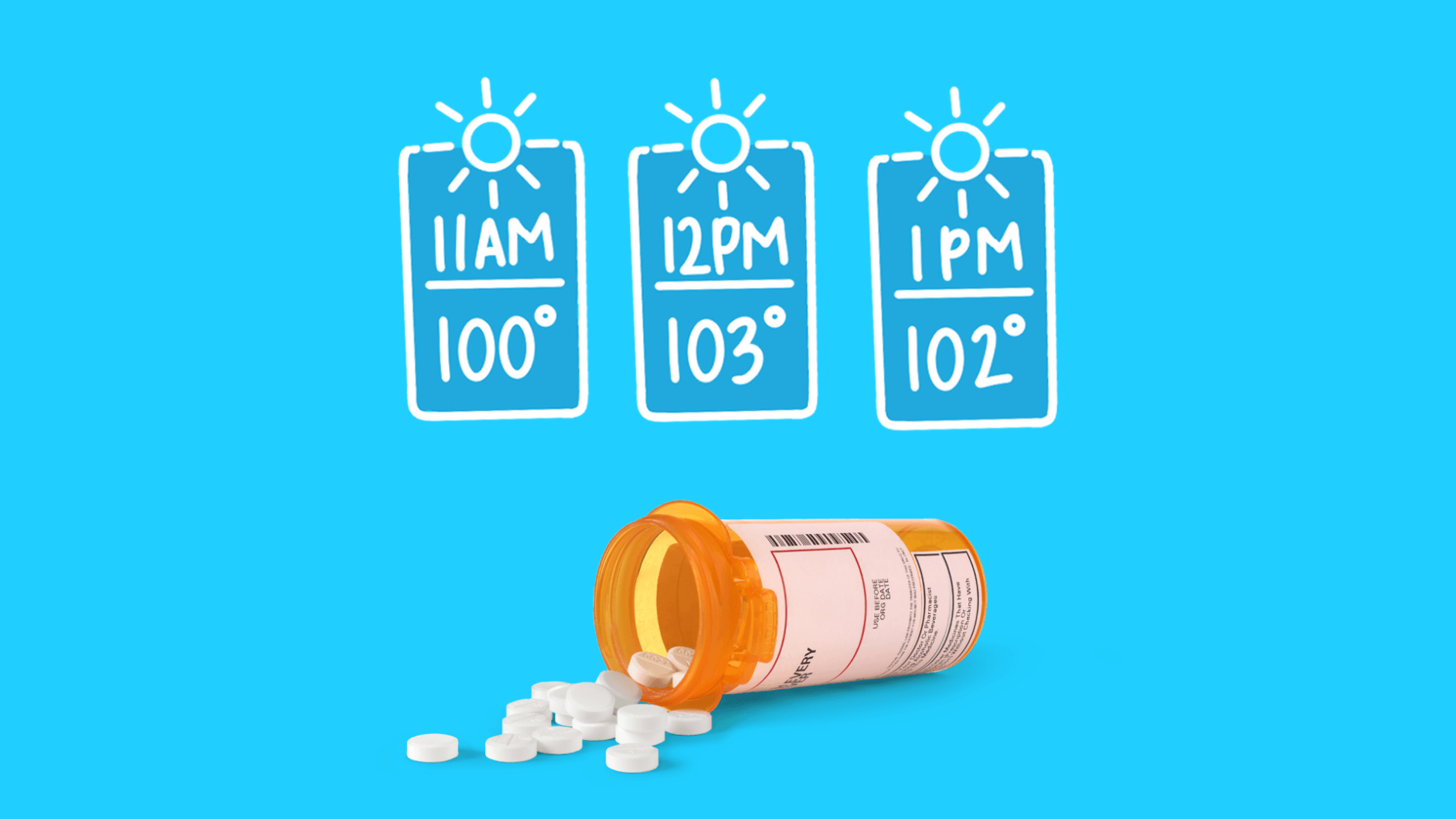When it comes to medication safety, keeping bottles away from children or sticking to the prescribed dose might come to mind. But have you considered medication temperature storage and how the heat outside could affect your medicine? As spring turns to summertime, it’s critical that your medication safety takes rising temperatures into account.
What is the best place to store medication?
Except for ones that require refrigeration, medication should be kept in a cool, dry place that’s away from heat, cold, humidity, or light. “Most medicines should be stored at 59 degrees Fahrenheit (F) to 77 F in a cool, dry place,” suggests Barbara Young, Pharm.D., a project editor at American Society of Health-System Pharmacists (ASHP) Patient Medication Information. That means the bathroom medicine cabinet or atop the refrigerator is out. A better choice is in the bedroom, a hallway closet, or a storage area.
Does heat affect medication?
Why does medicine storage matter so much? Medications are often manufactured in very specific conditions, and conditions that are too hot or cold can cause a change in the active ingredients. Extremes in temperature or humidity can lead to a release of degradation products, or impurities that form in poor storage conditions. This can result in reduced efficacy of the drug.
“Storage conditions are extremely important to the overall integrity and quality of medications,” says Irene V. Clavijo, Pharm.D., a pharmacy program manager for Conviva Care Centers based in Fort Lauderdale, Florida. “Following the manufacturer recommendations for proper storage is essential for preserving the active ingredient and preventing loss of potency of medications.”
Medications exposed to high temperatures are unlikely to cause adverse effects. However, that doesn’t mean they are still as effective as they were before being exposed to the extreme temperatures.
“Insulin is a good example,” Dr. Clavijo says. “This medication must be stored in the refrigerator until it is opened and, after that, it should be stored at room temperature. It can lose effectiveness if exposed to heat. Other life-saving medications, such as anti-seizure drugs, heart medications, or hormonal therapies, should not be exposed to heat at any time, as high temperatures can alter their effectiveness.”
Often, there aren’t visible changes to medications that have lost potency due to improper storage conditions, but “it is always recommended to look for discoloration, unusual odors, or changes in form or coating that may be indicators of compromised integrity of the product,” explains Dr. Clavijo. Some insurance companies may offer a one-time replacement of medications that have been exposed to extreme heat.
Can medicine make you more sun sensitive?
Medication storage isn’t the only thing to consider in the summertime. Photosensitivity, a chemically induced change in the skin, can make you more sensitive to the sunlight and can be brought on by certain medications, usually appearing as an exaggerated sunburn, says Dr. Clavijo.
Many common medications can increase the risk of a photosensitive reaction, including:
- Acne medications (isotretinoin)
- Analgesics (naproxen, ibuprofen, piroxicam, ketoprofen)
- Antibiotics (doxycycline, tetracycline, ciprofloxacin, levofloxacin, sulfamethoxazole-trimethoprim)
- Antifungals (griseofulvin, voriconazole)
- Antihistamines (cetirizine, loratadine, diphenhydramine)
- Cholesterol-lowering drugs (atorvastatin, simvastatin)
- Diabetic drugs (glipizide, glyburide)
- Diuretics (hydrochlorothiazide, chlorthalidone, furosemide)
To reduce your risk of sun damage, it’s recommended to seek out shade, particularly between 10 a.m. and 2 p.m., when the sun is highest; use a sunscreen that’s at least SPF 30; and wear protective clothing, like sunglasses, hats, and lightweight long-sleeve shirts. Other medications not listed here may also cause photosensitivity, so be sure to consult with your healthcare provider about all possible side effects before using any medication.
What about when I’m traveling?
It’s easier to keep your medicine in ideal storage conditions while at home, but what about traveling with prescription medication? If you’re going on a plane, be sure to keep your medication in your carry-on and not in checked baggage. “They may be exposed to extreme changes in temperature,” Dr. Young says, “and you may need access to your medications.”
If you’re traveling with refrigerated medication, “place it in a cooler, but be sure to not have the medication in direct contact with ice cubes or a cold pack that could cause the medication to be exposed to freezing temperatures,” says Dr. Young. To prevent this, wrap the medication in a cloth before placing it in the cooler.
Traveling by car? Keep the medication out of the trunk or glove box, where temperatures can soar past the outdoor highs. Be sure to take the medication with you whenever leaving the vehicle.
If you’re currently taking medications, you can still enjoy the sun, sand, and surf. Just be sure to take a few extra precautions first.











